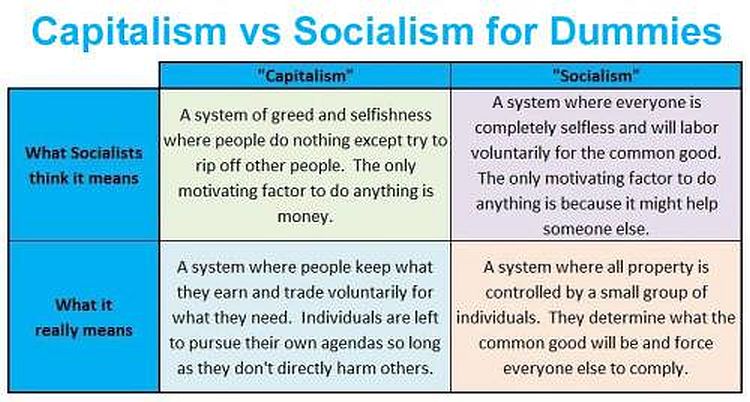Today, I am reposting a commentary I published a while back about socialism. As we rush toward the 2022 midterm elections, I can only hope that the infatuation some Americans have for the failed system called socialism has subsided. We shall see. Please read on.
We are hearing a lot today about the alleged advantages of socialism over the capitalist system that has been the main engine of wealth in the United States and the world.
Thousands of teachers in K-12 schools, university professors, and a growing number of Democrats in Congress are singing socialism’s praises, along with such half-baked Marxist ideas as Critical Race Theory and the 1619 Project, both of which a majority of historians have refuted and nullified as racist gibberish. #DefundCRT
Yet the socialist beat goes on, pushed by some members of Congress, Black Lives Matter, Antifa, and other felonious, semi-terrorist organizations.
In my post today, I am not going to argue against this failed system of government. I will let a couple of stories—one true and one perhaps apocryphal (though I have heard it is true)–help you decide for yourself if socialism is right for America.
But before I do, I will share a couple of thoughts about socialism with you.
The first comes from the American economist and social theorist Thomas Sowell, who is a senior fellow at Stanford University’s Hoover Institution.
“Socialism, in general, has a record of failure so blatant that only an intellectual could ignore or evade it,” Sowell has said.
The other is a rather simple definition of socialism. It comes from a variety of anonymous sources, with annotation from yours truly.
Here’s the way capitalism works. You buy a pizza and sell the slices for a profit to others who want pizza. Here’s the way socialism works. You and others are forced to share a pizza when you really want a hamburger. (Sorry AOC, you will never stop me from eating an In-And-Out Burger, no matter how much you yammer on about livestock flatulence).
Okay. Here’s the first socialist tale.
A few years ago, an economics professor at a Texas university said he had never before failed a single student but that he had, once, failed an entire class.
During a discussion of economic and political systems, the class insisted that socialism worked—that it was the great equalizer in which no one would be poor, and no one would be rich.
The professor tried to disabuse them of that notion, and when he failed, he said OK, if everybody agrees, we’re going to have a practical experiment on socialism in class.
Here is what he proposed: All grades would be averaged, and everyone would receive the same grade so that no one individual would fail and no one individual would receive an “A.” Everyone in the class would receive the same grade.
After the first test, the grades were averaged, and everyone got a “B.”
The students who studied hard were upset, and the students who studied little were happy. But, as the second test rolled around, the students who studied little studied even less, and the ones who studied hard decided they wanted a free ride too, so they studied very little. The second test average was a “D!”
No one was happy. When the third test rolled around, the average was an “F.”
The scores never increased as bickering, blame, and name-calling all resulted in hard feelings. No one would study for the benefit of anyone else.
To nobody’s surprise, everyone failed. Naturally, the class was not happy.
It was a powerful teaching moment, and the professor used it to show the class that socialism ultimately always fails because when the reward is great, the effort to succeed is great; but when the government (i.e., the professor) takes the reward away there is no incentive to work hard or to succeed.
Couldn’t be any simpler than that.
Now, to the true story of socialist theory in action.
Think back to 2015, and you may remember the story about a 10-year-old Seattle-based company called Gravity Payments and the decision by its CEO to pay all of his 120 employees the same minimum salary of $70,000.
Financial analysts hailed the “groundbreaking” move, while the left-leaning media praised Dan Price, the CEO of the credit card payment firm, for taking a $930,000 pay cut so he would earn the same $70,000 as the rest of his employees.

Socialists everywhere were giddy over what they called a “victory” in the fight to erase income inequality. From the outside looking in, that’s what Price’s socialist experiment looked like.
As the dust began to settle, it seemed like business as usual for Gravity Payments, but as it turned out, all was not well in the workforce. Staffers began to question why lesser-qualified employees with fewer responsibilities were making the same money they were. (Ahem, remember that Texas Tech professor and his students?)
What a shock! High achievers complained that people making the same salary as they were “clocking in and clocking out” as usual, while those in higher positions within the company stayed late to get their jobs done.
“It’s unfair,” they groused.
Who would have thought it? And it wasn’t just the staff that grew unhappy. Clients canceled contracts because they decided Price’s $70,000 stunt was nothing more than that—a stunt. Some saw it as a misguided political move to embrace socialism, while others didn’t want to be associated with a company that treated highly skilled employees “unfairly.”
Sure, the company wallowed in a tsunami of publicity from a besotted left-leaning media. It was inundated with new client applications, and, as expected, a flood of job applications poured in from those eager to earn $70,000 a year. What a deal.

Think about it if you are an ambitious young man or woman. You work your way through college. You study hard, make good grades, and eventually, you leave with a costly degree that will give you a jump start in the callous, cutthroat world. At work, you spend a few years paying your dues. You learn how to listen, how to work alongside your peers, and how to ascend the career ladder. You feel like all your hard work has finally been worth it. You are on a successful career path.
The same goes for those who do not go to college. You’ve worked hard, gained valuable experience in your chosen field, and ascended the same ladder as your college-educated peers. You see success ahead. Then, one day, the company you work for pulls this stunt.
Before you know it, Wanda, the receptionist, and Willard, who is fresh out of school and who only started at the company last month, are getting the same salary as you are.
Suddenly, that fantastic working environment you’re used to is satiated with bitterness. People are unhappy. When people are unhappy, performance wanes. Soon, the best workers leave for companies that they know will reward them for their talent and work. Then, what was a great company to work for with great client reviews, is now a sinking ship.
A sinking ship is a perfect metaphor for the disaster called socialism. If the United States moves toward that doomed system, there won’t be enough life rafts to go around.
But if the well-documented failure of socialism tells us anything, you better believe those at the top of the collectivist heap will be safely onshore.
Click on the link below for a short but insightful lesson from a successful CEO about the differences between socialism and capitalism.
https://www.prageru.com/video/capitalism-vs-socialism/
[If you enjoyed this post, please consider subscribing to ForeignCorrespondent and tell your friends to subscribe. IT’S FREE! WHAT A DEAL! If you’ve received this from a friend and would like to be added to our distribution list for future blog posts, please enter your email address in the sign up for notifications box on the right side of this post or at: https://ronaldyatesbooks.com/category/foreign-correspondent You can also find my commentaries on the American Free News Network at https://afnn.us. And please feel free to comment. WE LOVE COMMENTS!]

